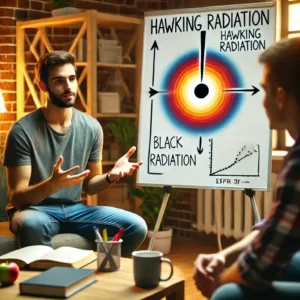Black holes are famous for trapping everything in their path, including light. But there is another mystery associated with them, the black hole information paradox. This paradox asks an important question: what happens to information about objects swallowed by a black hole? Does it disappear forever, or can it somehow escape? According to physics, information should never be lost, but black holes seem to challenge this idea. Scientists have been struggling with this challenge for years. Stephen Hawking further fueled this debate by introducing a new idea, Hawking radiation.
The universe does not allow information to be lost—Stephen Hawking
His words continue to resonate in modern physics, and fuel the debate over whether information can truly be lost in a black hole.
What is Hawking Radiation?
In 1974, Stephen Hawking found that black holes are not completely black. They actually emit low-energy radiations, now known as Hawking radiation. This radiation slowly carries mass away from the black hole, causing it to evaporate over time. Quantum effects near the event horizon, the boundary of the black hole, are responsible for this process. However, the main issue is that Hawking radiation doesn’t carry any information about the matter the black hole swallows.
What is Paradox?
The black hole information paradox is more than a thought experiment. It directly challenges the basic tenets of physics. If black holes erase information, this idea conflicts with quantum mechanics, which insists that information must be preserved. This paradox sparks ongoing debate, forcing scientists to rethink their understanding of how the universe works.
Ideas to Solve the Paradox
Scientists have proposed several solutions to this paradox:
- Holographic principle: Some believe that all information in a black hole is stored on its surface, not inside.
- Firewall: Some have suggested that a “firewall” exists on the horizon. Such a firewall would destroy any information that attempted to pass through it.
- Hawking’s new idea: Before he died, Hawking advocated a new idea that quantum fluctuations may be able to carry information out, although the mechanism by which this happens is unknown.
Recent Developments in Theoretical Physics
Recent advances in quantum gravity and research have reignited the debate over the black hole information paradox. Scientists now think that Hawking radiation may contain information, challenging the earlier belief that it is information-free. The Page curve is central to this new idea. It explains how information can be preserved even when a black hole evaporates rather than disappears.
When Hawking radiation causes a black hole to shrink, some lost information may actually escape through the radiation itself. This suggests that the paradox can be resolved without breaking the rules of quantum mechanics.
Although these ideas are promising, they rely on quantum gravity, a theory we still don’t fully understand. Still, these findings give hope that we can one day resolve the paradox and unify our understanding of the universe.
Challenges in Detecting Hawking Radiation

Even though Hawking radiation is a theoretical breakthrough, it has proven to be extremely difficult to detect. The radiation emitted by black holes is incredibly weak, making it nearly impossible to observe with current technology. The temperature of the radiation is so low that it is even colder than the cosmic microwave background, the heat left over from the Big Bang, which masks the faint signals.
Physicists face a major challenge in gathering observational evidence to support Hawking’s theory. Without direct evidence, it is difficult to confirm whether the information paradox can indeed be resolved by Hawking radiation. Despite these challenges, ongoing advances in technology and astronomical observation techniques may eventually help detect this elusive radiation.
Conclusion
The black hole information paradox still confuses physicists, and solving it could change the way we view the universe. Hawking radiation gives us a clue, but there is still a lot we don’t understand. As technology advances, and we learn more about quantum gravity, we may eventually figure out how black holes work at their core.
Future studies could answer some of the biggest questions in physics. This will help us better understand both quantum mechanics and general relativity. Solving the black hole information paradox will likely remain a main focus of scientific research for many years.
FAQs
Q1: What is the black hole information paradox?
This is a strange thought about the information paradox of black holes: information about anything that falls into a black hole disappears and distorts our knowledge of physics. It’s like throwing a book into a fire and wondering if the story inside is lost forever!
Q2: What is Hawking radiation?
Hawking radiation is the shooting out of tiny bits of energy from a black hole, as if it were leaking particles. This is a great idea in the first place because it suggests that black holes could slowly shrink and disappear completely.
Q3: Can Hawking radiation explain the paradox?
This concept, known as Hawking radiation, involves black holes slowly emitting energy and losing their mass. Some scientists believe that this will lead to all the information trapped in black holes being released back into the universe in the future.
Q4: Why is this paradox important?
Paradoxes are essential in that they break us out of our usual ways of thinking, help us find new perspectives, and deepen our understanding of complex concepts. This stimulates curiosity and sharpens critical thinking skills.




